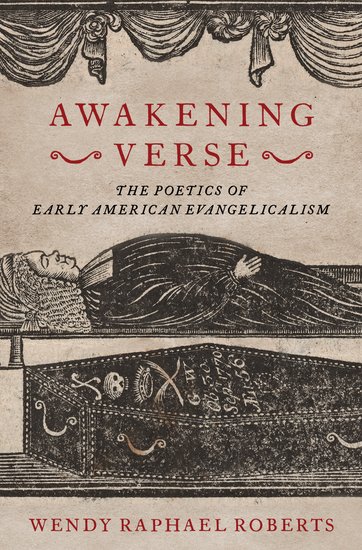Professor Wendy Roberts awarded 2022 Early American Literature Book Prize

Congratulations to Professor Wendy Roberts for her receipt of the 2022 Early American Literature Book Prize for her monograph Awakening Verse: The Poetics of Early American Evangelicalism (2020). Early American Literature is the most prestigious academic journal in Professor Roberts' field.
The following official public announcement and prize citation was released by the journal:
"Congratulations to Wendy Raphael Roberts, author of Awakening Verse: The Poetics of Early American Evangelicalism, which has won our 2022 Book Prize.
Roberts' Awakening Verse: The Poetics of Early American Evangelicalism was published by Oxford University Press in 2020. The prize selection committee consisted of Early American Literature's Co-Editor for Reviews, Katy Chiles; our Advisory Editor, Sandra Gustafson; incoming Chair of the Modern Language Association's Early American Forum, Kirsten Silva Gruesz; and prior President of the Society of Early Americanists, Patrick Erben, with EAL Editor Marion Rust as an ex officio member. We thank our publisher, the University of North Carolina Press, for continuing to support the award, which carries a $2,000 cash prize.
The selection committee praised Awakening Verse as 'well-structured, coherent, erudite, and up to date': a 'rare and important work' existing 'at the forefront of the critical turn that investigates aesthetics, feeling, and faith as formative elements in the development of American culture from the mid-eighteenth century through the Romantic period and beyond.' Awakening Verse attends to revival poetry's role in engendering the outpouring of religious enthusiasm that characterized the First and Second Great Awakenings. It represents the best of a recent wave of research that focusees on the aesthetic and other pleasures to be found in early American Calvinist-based faith traditions, countering the common misconception of Puritanism as a religion for which misery was the only assurance.
Within this trajectory, it does something entirely new by focusing on the overlooked archive of popular religious poetry, written and read by everyday individuals—often women—throughout the eighteenth century and beyond. It was revival poetry that drew evangelical converts to their faith, Roberts argues, even more than the sermons, hymnodies, and other religious literature most commonly associated with conversion. To put it briefly: 'Poetry saved.'
In the process, poetry changed. Once distinguished from the hymn an elite form 'fit for the cultured and educated reader,' Roberts explains, the poetry championed by 'poet-ministers' and 'sound believers' alike 'aspired to be a universally accessible aesthetic form.'"


